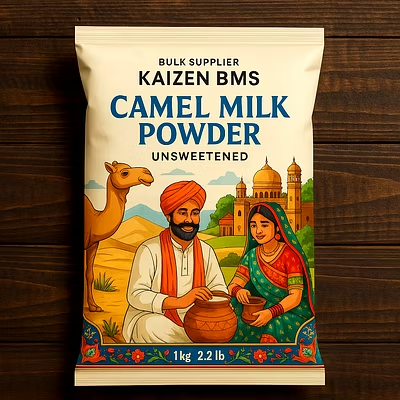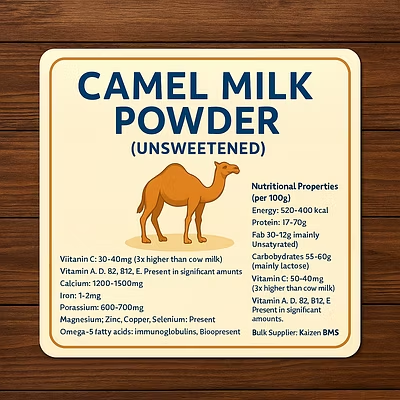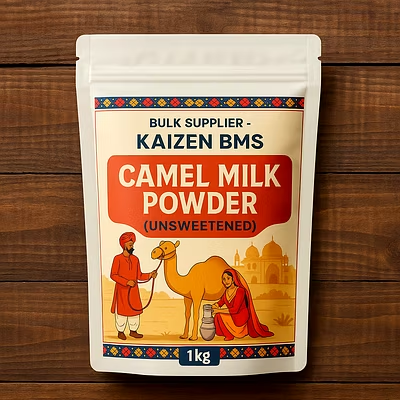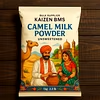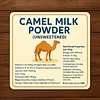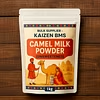Camel Milk Powder (Unsweetened)
-
Product is not available
Country Of Origin : India
Product Introduction: Camel Milk Powder (Unsweetened)
Camel Milk Powder (Unsweetened) is a premium dairy alternative produced by spray-drying or freeze-drying fresh camel milk to retain its unique nutritional and functional properties. Celebrated for its digestibility, hypoallergenic nature, and rich micronutrient content, camel milk powder is an ideal choice for consumers with lactose intolerance, those seeking functional foods, and manufacturers looking for a versatile, shelf-stable ingredient. Its natural composition, mild taste, and therapeutic benefits make it suitable for health-conscious individuals, infants, elderly, and those with special dietary needs.
How It Fulfills Client Needs
• Hypoallergenic & Digestible: Naturally lower in lactose and allergenic proteins, making it suitable for people with cow milk allergies or lactose intolerance.
• Nutrient-Rich: Provides higher levels of vitamin C, B vitamins, calcium, iron, potassium, magnesium, and zinc compared to cow’s milk.
• Functional Benefits: Contains bioactive peptides, immunoglobulins, and antioxidants that support immunity, gut health, and overall wellness.
• Long Shelf Life & Portability: Powder form ensures a shelf life of up to 18 months, easy storage, and transportation without refrigeration.
• Versatile Applications: Can be used in beverages, infant and elderly nutrition, dietary supplements, cosmetics, and specialty foods.
Product Classification Parameter Details
HSN Code 04049000 (Other milk and cream powder, unsweetened)
Category Dairy Products
Subcategory Camel Milk Powder (Unsweetened)
Product Details Nutritional Properties (per 100g)
• Energy: 370–400 kcal
• Protein: 17–20g
• Fat: 10–12g (mainly unsaturated)
• Carbohydrates: 55–60g (mainly lactose)
• Vitamin C: 30–40mg (3x higher than cow milk)
• Vitamin A, D, B2, B12, E: Present in significant amounts
• Calcium: 1200–1300mg
• Iron: 1–2mg
• Potassium: 600–700mg
• Magnesium, Zinc, Copper, Selenium: Present
• Omega-3 fatty acids, Immunoglobulins, Bioactive peptides: Present
• No added sugar, preservatives, or flavors
Technical Properties
• Solubility: Excellent, disperses rapidly in water
• Shelf Life: 12–18 months (sealed, ambient)
• Moisture Content: ≤ 5%
• Microbiological Standards: Complies with international food safety norms
Chemical Properties
• Main Components: Milk proteins (casein, whey), lactose, minerals, vitamins, bioactive peptides
• pH (10% solution): 6.5–6.8
• Low cholesterol, low allergenic proteins
• No additives or neutralizing agents
Physical Properties
• Appearance: Fine, free-flowing, white to light cream powder
• Odor/Flavor: Clean, mild, slightly sweet, characteristic of camel milk
• Bulk Density: 0.50–0.60 g/cm³
• Particle Size: Uniform, low dusting
Manufacturing Methods
• Collection & Inspection: Fresh camel milk is collected and filtered for quality.
• Pasteurization: Milk is pasteurized at 75–85°C for 20–30 minutes.
• Homogenization: Ensures uniformity and stability.
• Concentration: Partial removal of water by evaporation.
• Spray Drying / Freeze Drying: Converts concentrated milk into powder while preserving nutrients and bioactive compounds.
• Cooling & Sieving: Powder is cooled and sieved for uniformity.
• Packaging: Packed in food-grade, moisture-proof bags or containers.
Industrial Uses
• Food & Beverage: Infant and elderly nutrition, dairy drinks, bakery, confectionery, ice cream, sauces, soups, and ready-to-eat meals.
• Nutrition: Dietary supplements, protein shakes, health foods.
• Cosmetics: Used in skincare and bath products for its nourishing and antioxidant properties.
• Medical Nutrition: For patients with allergies, diabetes, or special dietary needs.
Market Overview: Global Demand & Indian Supply
• Global Demand: Camel milk powder is in strong demand in the Middle East, Africa, Europe, and Asia-Pacific, driven by its nutritional, medicinal, and hypoallergenic properties. The market is growing due to rising health awareness and demand for alternative dairy products.
• Indian Supply: India is emerging as a reliable supplier, with increasing investment in ethical camel farming and advanced processing to meet international standards.
Packaging & Logistics
• Standard Packaging: 1kg, 5kg, and 25kg food-grade aluminum foil pouches or multi-layer kraft paper bags with inner liners.
• Bulk Packaging: 500kg–1,000kg jumbo bags for industrial buyers.
• Shipping Dimensions & Weight:
- 25kg bag: Approx. 80cm x 50cm x 14cm, gross weight ~25.2kg
- oPalletized for container shipping (20ft container holds ~16 MT)
• Storage: Store in a cool, dry place away from direct sunlight.
• Lead Time: 2–3 weeks for standard export orders.
Preferred INCO Terms
• FOB (Free On Board)
• CFR (Cost and Freight)
• CIF (Cost, Insurance, and Freight)

